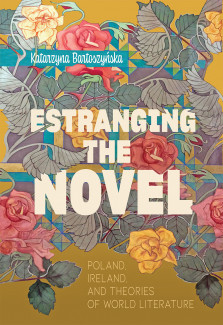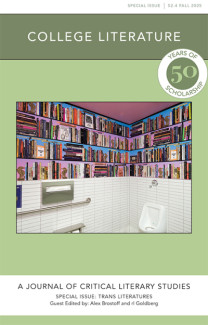
Johns Hopkins UniversityEst. 1876
America’s First Research University
Now Browsing:
Estranging the Novel: Poland, Ireland, and Theories of World Literature

My book began, as many academic books do, as a dissertation, with a seemingly simple observation: Polish and Irish literature are remarkably similar to each other. I had arrived in graduate school planning to study 20th century Polish and German writing, and maybe learn Yiddish, but I had a hole to fill in my schedule, and I signed up for an Irish literature class, knowing little more about the subject than what I’d gleaned from reading Angela’s Ashes and How the Irish Saved Civilization as a teenager. In the back of my mind was my grandmother’s observation, upon returning to Poland from a vacation in Ireland, that “they are just like us, in so many ways!” And so, as the professor, Jim Chandler, described the unique qualities of Irish fiction, and especially, of particular novels, texts that seemed like bizarre anomalies in relation to the British tradition, I found, to my surprise and delight, that these peculiar features all had close correspondences in Polish writing — almost eerily so, in some cases. I began to make a list of these mysterious pairs of Polish and Irish novels that were remarkably, fascinatingly, similar to each other, and apparently different from other fictions written during the same time. And I quickly decided that this was what I wanted to write my dissertation on.
But what “this” was, exactly, soon proved more complex than I had realized. I had noticed the resemblance, but what was I trying to understand, or say, about it?
Historicist studies of literature, and Marxist theories of uneven development, seemed to offer a clear path for explaining the commonalities between these traditions — Poland and Ireland have had fairly similar histories, featuring persecution from powerful neighbors, experiences of conquest, a largely agrarian economy, and the lack of a strong middle class. There are cultural resemblances as well: a strong attachment to Catholicism, a tradition of exile, a darkly ironic sense of humor. From this perspective, the resemblance between the literary traditions was not only not surprising, it even appeared overdetermined. I could, perhaps, write a dissertation explaining all of that, with specific evidence from different novels to support my theory, but…I didn’t want to. Indeed, I found those socio-historical explanations largely unsatisfying.

What I really wanted to write about, and think about, were the particularities of these various pairs of novels. I realized that the features that I found so fascinating were often overlooked in scholarship, or noted but not explored in detail, precisely because they were qualities seen as anomalous, and literary scholarship tends, rather, to gravitate towards traits that are representative of a given genre or trend.
As I delved into those aspects, each chapter of the book began to take shape around a pair of texts, to illuminate the complexities of their formal mechanics, and the unexpected things they revealed about the novel form as a whole. So, for instance, in the first chapter, closely reading Jonathan Swift’s Gulliver’s Travels and Ignacy Krasicki’s Mikołaja Doświadczyńskiego przypadki, The Adventures of Mr. Nicholas Wisdom, and pondering the way they simultaneously seem to offer a vision of a utopian society, but also deny its feasibility as a real solution, led me to an argument about how irony functions in both texts. Noticing the way these novels call upon readers to identify with the protagonist at some moments, and read him ironically at others, opens onto the broader question of how politically-minded fictions strive to persuade their readers, and how the two apparently contradictory strategies of sincere argument and satire (often seen as two separate strains in the novel form’s evolution) can actually be deployed at the same time.
But even when the various chapters were finished, I still didn’t understand how they all fit together. In my dissertation defense, I suggested that in a way, my project was a failure: I had aimed to understand the resemblance between Polish and Irish fiction, and I still didn’t have a good answer for it. It was only several years later, as I began to read more deeply in world literature studies, and to understand world literature, not as an archive, but as a conceptual problem — what is it? How do we read it? — that I began to understand what my book was really doing. The evidence I was amassing in my chapters was not confirming claims about uneven development, or historical trauma. It was illuminating the insufficiencies of dominant paradigms for thinking about the emergence of the novel, showing that an account of The Novel could not simply be the story of rising Anglo-French realism. I arrived at a bolder, more ambitious argument: rather than being an effort to append a Polish-Irish supplement to the history of the novel, my book, instead, proposes a new framework for a global understanding of the novel form.
Order Estranging the Novel: Poland, Ireland, and Theories of World Literature at the following link: https://jhupbooks.press.jhu.edu/title/estranging-novel
Katarzyna Bartoszyńska is an assistant professor of English and women's and gender studies at Ithaca College. She is the author of Estranging the Novel: Poland, Ireland, and Theories of World Literature.

But what “this” was, exactly, soon proved more complex than I had realized. I had noticed the resemblance, but what was I trying to understand, or say, about it?
Historicist studies of literature, and Marxist theories of uneven development, seemed to offer a clear path for explaining the commonalities between these traditions — Poland and Ireland have had fairly similar histories, featuring persecution from powerful neighbors, experiences of conquest, a largely agrarian economy, and the lack of a strong middle class. There are cultural resemblances as well: a strong attachment to Catholicism, a tradition of exile, a darkly ironic sense of humor. From this perspective, the resemblance between the literary traditions was not only not surprising, it even appeared overdetermined. I could, perhaps, write a dissertation explaining all of that, with specific evidence from different novels to support my theory, but…I didn’t want to. Indeed, I found those socio-historical explanations largely unsatisfying.

What I really wanted to write about, and think about, were the particularities of these various pairs of novels. I realized that the features that I found so fascinating were often overlooked in scholarship, or noted but not explored in detail, precisely because they were qualities seen as anomalous, and literary scholarship tends, rather, to gravitate towards traits that are representative of a given genre or trend.
As I delved into those aspects, each chapter of the book began to take shape around a pair of texts, to illuminate the complexities of their formal mechanics, and the unexpected things they revealed about the novel form as a whole. So, for instance, in the first chapter, closely reading Jonathan Swift’s Gulliver’s Travels and Ignacy Krasicki’s Mikołaja Doświadczyńskiego przypadki, The Adventures of Mr. Nicholas Wisdom, and pondering the way they simultaneously seem to offer a vision of a utopian society, but also deny its feasibility as a real solution, led me to an argument about how irony functions in both texts. Noticing the way these novels call upon readers to identify with the protagonist at some moments, and read him ironically at others, opens onto the broader question of how politically-minded fictions strive to persuade their readers, and how the two apparently contradictory strategies of sincere argument and satire (often seen as two separate strains in the novel form’s evolution) can actually be deployed at the same time.
But even when the various chapters were finished, I still didn’t understand how they all fit together. In my dissertation defense, I suggested that in a way, my project was a failure: I had aimed to understand the resemblance between Polish and Irish fiction, and I still didn’t have a good answer for it. It was only several years later, as I began to read more deeply in world literature studies, and to understand world literature, not as an archive, but as a conceptual problem — what is it? How do we read it? — that I began to understand what my book was really doing. The evidence I was amassing in my chapters was not confirming claims about uneven development, or historical trauma. It was illuminating the insufficiencies of dominant paradigms for thinking about the emergence of the novel, showing that an account of The Novel could not simply be the story of rising Anglo-French realism. I arrived at a bolder, more ambitious argument: rather than being an effort to append a Polish-Irish supplement to the history of the novel, my book, instead, proposes a new framework for a global understanding of the novel form.
Order Estranging the Novel: Poland, Ireland, and Theories of World Literature at the following link: https://jhupbooks.press.jhu.edu/title/estranging-novel
Katarzyna Bartoszyńska is an assistant professor of English and women's and gender studies at Ithaca College. She is the author of Estranging the Novel: Poland, Ireland, and Theories of World Literature.

Login to View & Leave Comments
Login to View & Leave Comments


